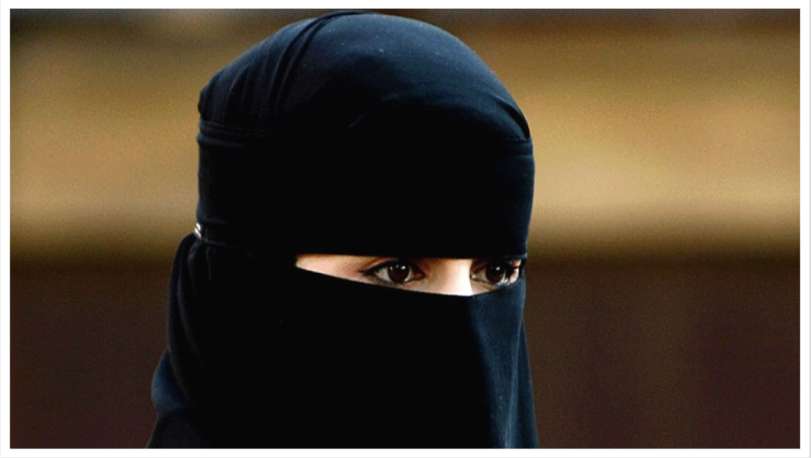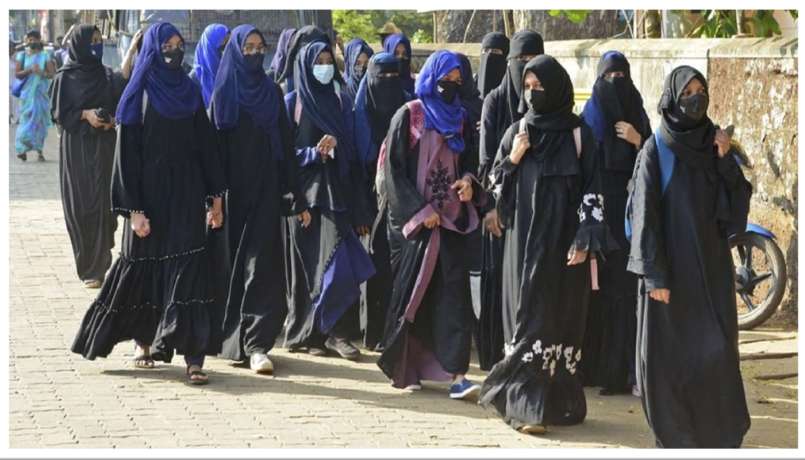
How Did It Start?
- Six female students from the Government PU College for Girls in Udupi were barred from attending courses because they wore hijab. On December 31, 2021, the students staged a protest, alleging that the institution had denied them access to classrooms for the previous 15 days. Raghupathi Bhat, a Udupi BJP MLA who chairs the college’s development committee, met with parents and other stakeholders. In the lecture, he advised pupils to adhere to the college’s clothing code. The six pupils decided to leave the classroom. The pupils petitioned the Karnataka High Court and the National Human Rights Commission.
Why Did Other Educational Institutions Get Involved?

- Following this event, a number of males from Kundapur’s Government Pre University College wore saffron shawls to school in protest of certain girls wearing hijab in class. Haladi Srinivas Shetty, a Kundapura MLA, met with parents and encouraged students to follow the college’s dress code till the government makes a final judgement on the matter. For the past five days, some female college students have started wearing hijab to class, according to the MLA. The female students, on the other side, have stated that they should not be compelled to leave the college because of a “sudden change in the dress code” that prohibits hijab. Several Hindu lads have been seen wearing saffron shawls to counteract girls wearing hijab, but they, too, have been prevented from entering classes. Several colleges in the coastal Karnataka region of Udupi have reported similar incidents. When students from IDSG Government First Grade College came in Chikkamagaluru wearing blue shawls, the row took a new turn. They raised their voices in favour of Muslim females, chanting Jai Bhim chants. They stated that wearing hijab in colleges is permissible as a religious practice.
What Has The Government Said?

Students must follow the uniform/dress code imposed by College Development Committees, according to a Karnataka government decree. B.C. Nagesh, the Minister of Primary and Secondary Education, claimed that rules enacted under the Karnataka Educational Act 2013 and 2018 have given educational institutions the authority to impose uniforms for school/PU college students. The department published a circular based on these guidelines, urging students to obey the consistent norms set out by universities until the High Court rules on the case. Though college uniforms are not required, College Development Committees, generally led by local MLAs, have insisted on a dress code in Udupi and other areas, including the prohibition of hijabs.
Kapil Sibal Mentions Karnataka Hijab Case In Supreme Court

- In Karnataka, the debate over wearing hijab to school and college is being settled all across the country. Following the High Court, the case has now reached the Supreme Court. Kapil Sibal, a Congress politician, and prominent counsel brought this subject before the Supreme Court, as well as the controversy surrounding it. The Supreme Court, on the other hand, has flatly refused to consider it any time soon. At the same time, the court rejected the High Court’s request to move the case to the Supreme Court. ‘Only two months remain till the test,’ Kapil Sibal stated. In the morning, we submitted a petition in this regard. The case should be heard by a panel of nine judges. In this case, the Supreme Court should get involved. Schools and colleges have all shuttered their doors. There have been stoned girls. As a result, the Supreme Court should be aware of this. “Today, a three-judge panel of the Karnataka High Court will hear the petition,” Chief Justice of India NV Raman remarked. At such instances, it is inappropriate to intervene. This case will not be heard in the High Court if we file it in the Supreme Court.
Highlights About Hijab Controversy

The Karnataka government emphasised on Monday that the hijab is not a mandatory religious practice and that religious training should be kept out of schools. “We believe that wearing the hijab is not a religious requirement. Dr B R Ambedkar made a speech in the Constituent Assembly, saying, “Let us maintain religious instructions outside educational institutions.” “Prabhuling Navadgi, the Karnataka Advocate General, addressed the High Court’s entire bench, which is hearing the Hijab matter. Chief Justice Ritu Raj Awasthi, Justice J M Khazi, and Justice Krishna M Dixit make up the entire bench. According to the AG, only basic religious practises are protected under Article 25, which ensures persons’ right to follow their chosen faith. As part of Article 25, he also mentioned “reforms in religion.” As soon as the hearing began, CJ Awasthi stated that certain clarifications on the Hijab were necessary.
“You claim that government orders are harmless, claiming that the state government has neither outlawed Hijab nor imposed any limits on it. According to the GO, students must wear the required uniform. What is your opinion on whether or not Hijab should be authorised in educational institutions? “Enquired the Chief Justice. The AG cited the Sabarimala case, in which the Court cited the Durgah Committee v Syed Hussain Ali case. The court had stated that merely secular subjects clothed in a religious form are not protected as an important feature of the constitution.
The court stated that in addition to conducting a judicial investigation to determine whether a practice claimed to be essential was in fact grounded in religious scriptures, beliefs, and tenets, it would ‘carefully scrutinize’ that the practice claiming constitutional protection does not rely on superstition. In response, Navadgi stated that if the institutions permit it, the government may make a judgement as the situation arises. Six female students from a college in Udupi attended a news conference organised by Campus Front of India (CFI) in the coastal town on January 1 to protest the college administrators’ refusal to allow them into the classroom because they were wearing the hijab. This comes four days after they asked permission from the principal to wear hijabs in class, which they were denied.
According to the college administrator Rudre Gowda, pupils used to wear Hijab to campus and join the classroom after removing their scarves. “There was no such regulation against Hijab-wearing at the institution, and no one had worn it to class in the previous 35 years.” “The students who came with the demand had other forces behind them,” Rudre Gowda had stated.
Top 13 Controversial Facts
Six students were denied access into classrooms by college administrators in Karnataka’s Udupi district, 400 kilometers from Bengaluru, in January this year because they were wearing hijab, according to the students and their parents. The incident occurred in a state-run pre-university college.
Uttar Pradesh, too, has had its share of hijab controversy in the past. The family of two Muslim students said that in November 2017, a Catholic school in Uttar Pradesh’s Barabanki district forbade two Muslim students from wearing the headscarf on campus, claiming that it violated the school’s uniform code. St Joseph’s Inter College in Lucknow had to face a magisterial inquiry in 2015 after it reportedly sent a Class 9 student home for wearing the hijab, claiming she had broken the school’s dress code.
In the wake of the Karnataka hijab issue, UP (Uttar Pradesh) deputy chief minister Dinesh Sharma remarked on Wednesday that no similar complaint has been received in his state, where the administration has been working under the slogan “Sabka Saath Sabka Vikas” and will continue to do so in the future.
When asked about the matter a day before the first phase of election in Uttar Pradesh on Thursday, Uttar Pradesh deputy chief minister Dinesh Sharma answered this. Between February 10 and March 7, the state will vote in seven stages.
“I am not making any remark on the topic,” said Uttar Pradesh deputy chief minister Dinesh Sharma, who is also the state’s higher and secondary education minister.
I’m only stating that our slogan is Sabka Saath, Sabka Vikas (everyone’s support, everyone’s growth), and we will work in accordance with it. He stated “We haven’t received any such complaints as of yet. There will be no doubt in my mind about it. Our slogan and motivation will not change.”
The remark comes amid the ongoing hijab debate in Karnataka, which has caused all educational institutions in the state to close for three days.
“Whether it is a bikini, a Ghoonghat, a pair of trousers, or a hijab, it is a woman’s right to pick what she wants to wear,” Congress national secretary Priyanka Gandhi Vadra wrote in a tweet. The Indian constitution GUARANTEES this right. Women should not be harassed. #ladkihoonladsaktihoon.”
The Congress’s election slogan for women’s empowerment in Uttar Pradesh is Ladki hoon lad Sakti hoon. “It is a woman’s right to pick what she wants to wear,” she said. The right is protected by the Indian Constitution.”
Earlier in the Karnataka hijab issue, her brother and Congress leader Rahul Gandhi backed the protesting students. “By allowing students’ hijab to obstruct their education, we are robbing the future of India’s daughters.” All people benefit from Ma Saraswati’s wisdom. “She doesn’t distinguish,” Rahul Gandhi had previously tweeted.
“Wearing the hijab does not contravene Article 25 of the Indian Constitution,” claimed Sadaf Tasneem, a student at Lucknow University. Those demonstrating against the hijab are infringing on Articles 25 and 14 of the Indian Constitution, which allow and safeguard religious freedom.
Apartheid is the segregation of females based on their religious customary practice.”Schools are revered as educational temples, and it is customary to visit the temples with one’s head veiled. “It is preferable that even those who are protesting the hijab wear a saffron cloth on their heads like a hijab,” she remarked.
“India is a democratic nation, and no one is allowed to meddle in how a person dresses,” Monisa Jamal, a homemaker and mother of two Delhi University graduates, remarked. I am a Muslim lady who does not wear the hijab, but I cannot judge women who do since India is a place of variety, and every culture has a unique manner of wearing that helps them stand out. No one should be able to prevent a Muslim woman from wearing a headscarf, a Sikh from wearing a turban, a Hindu lady from practicing the “Ghoonghat” culture, or individuals of other cultures from freely following their traditions. It’s both a constitutional right and a decency act.”







